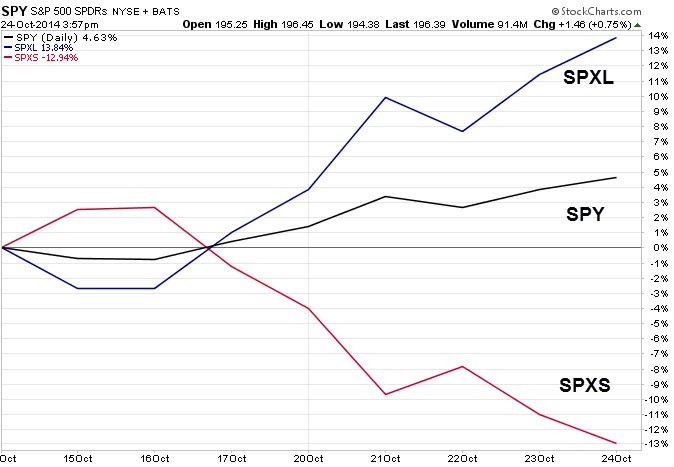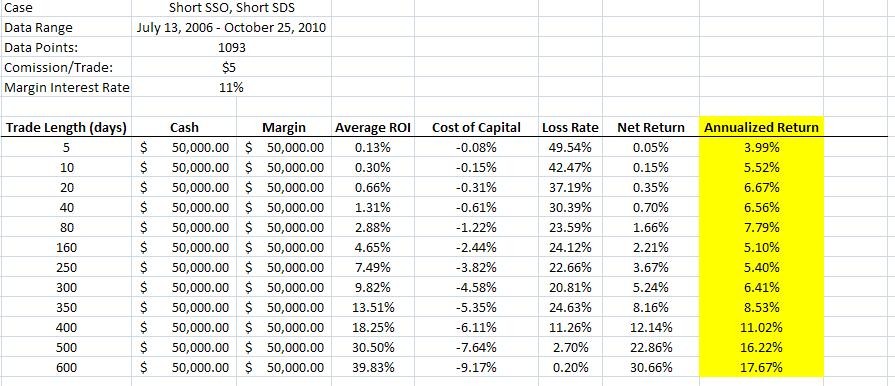FAQ Why I Trade Leveraged Mutual Funds
Post on: 2 Апрель, 2015 No Comment

FAQ: Why I Trade Leveraged Mutual Funds
09Mar09
First, for the uninitiated, leveraged MFs defined
Leveraged MFs (from Rydex. ProFunds. or Direxion ) are like regular index funds in the sense that they (a) closely track some underlying benchmark such as the S&P 500 (unlike ETFs which suffer significant tracking error), and (b) only trade once per day at the close.
As the name implies, they are leveraged, meaning that they magnify daily returns (by 2X in most cases). At all three fund companies, exchanging to/from funds (or to/from money market) incurs no transaction costs or slippage, only an annual fund expense ratio (albeit a hefty one).
The biggest drawback of these funds is that they do not allow for intraday orders such as stops or limits, so by themselves, no intraday protection is available. That is of course an enormous concern for short-term traders such as ourselves (and a big reason why we employ things like the Abnormal Market Filter ).
Why Leveraged Mutual Funds?
Let me say first, that my solution is only my solution. It matches my trading style. That’s makes it a very personal answer and not necessarily appropriate for anyone other than myself. Having said that…
My FIVE reasons:
Robust Strategy Development: because these funds (unlike ETFs) track the underlying index so closely, I can designed my strategies using index data (such as from the S&P 500) rather than a specific fund. This is important because more data means a potentially more robust solution. Give me five years worth of data, and I’ll give you a shot in the dark. Give me fifty years of data, and I’ll give you a strategy .
Small Trading Advantages: many of the advantages we trade are so small, that trading friction (i.e. execution costs and slippage) would effectively kill them. Having no per-trade costs means that we can pursue short-term swing trades that might not be available to other traders.

Account Size Scalability: my business isn’t blogging (as my inconsistent posting schedule makes obvious), it’s managing accounts through our relationship with Comprehensive Capital Management. Another advantage of no per-trade transaction costs is that every account we manage achieves more or less the same results regardless of account size. The young investor placing $25k gets the same benefit as the financial advisor placing $25m. Call me a softie, but to me that just seems right.
Selective Leverage: everything I’ve written so far is really about why I trade mutual funds. But why do I sometimes use leverage? In a nutshell, I believe the vast majority of the time, the market isn’t very predictable. But during those less-common times where our models believe a real competitive advantage exists, I want to be able to throw leverage at that day to maximize the impact on the portfolio.
Fire and Forget: I’ve come to realize all of the above advantages over time. My initial reason for using leveraged mutual funds way-back-when had to do with my personality. I have absolutely no desire to sit in front of a computer screen every day…I’m actually getting an involuntary gag reflex just thinking about it. For all the time I spend running my business, developing strategies, etc. I spend very little time actually trading (about 10 minutes a day to be exact). Leveraged mutual funds work well for me because I can make my trades, walk away, and do something more fun than wondering where the next tick on the market is going.
Just my $0.02.
Happy Trading,
To stay up to date with what’s happening at the MarketSci Blog, we recommend subscribing to our RSS Feed or Email Feed .














